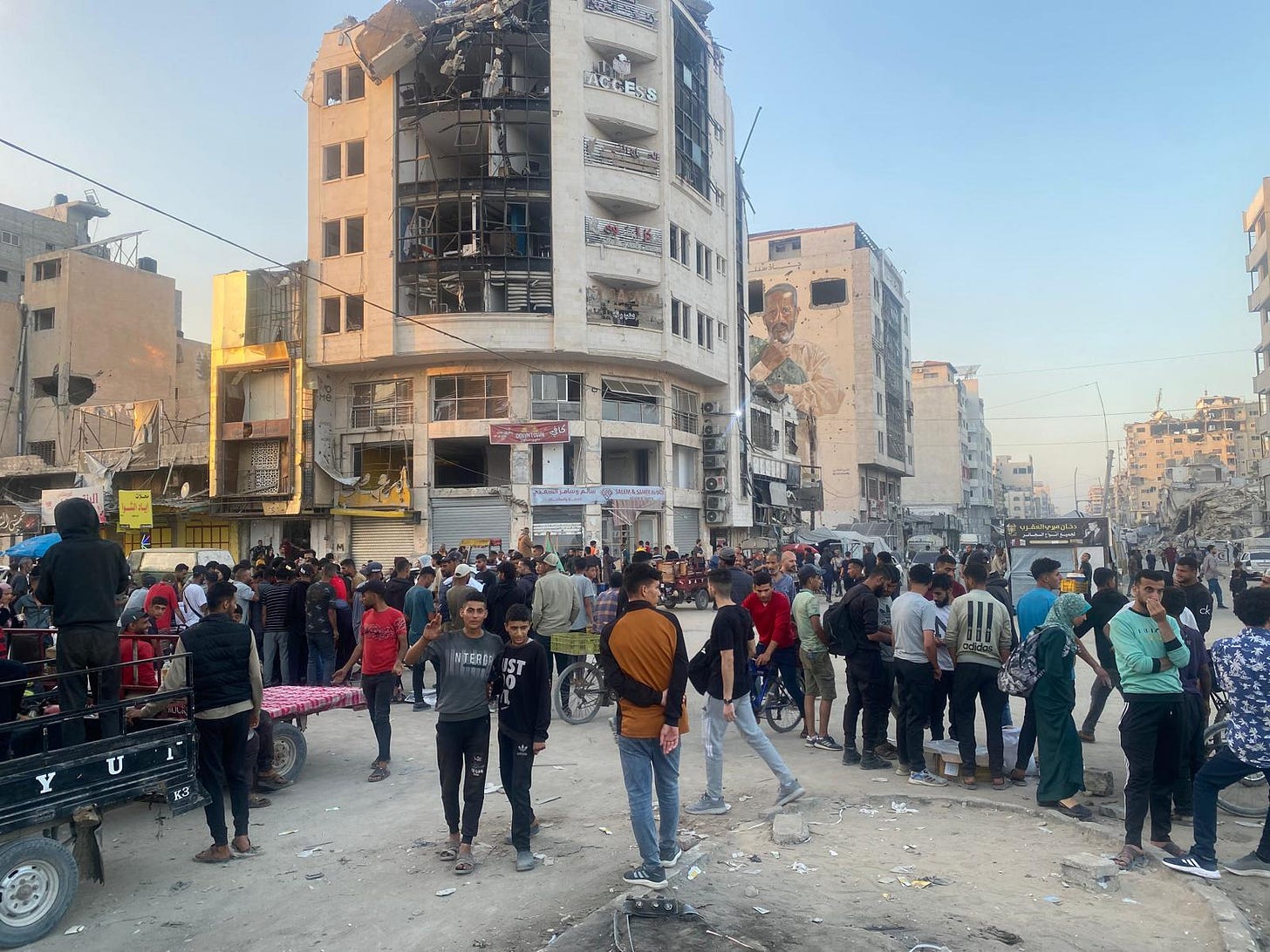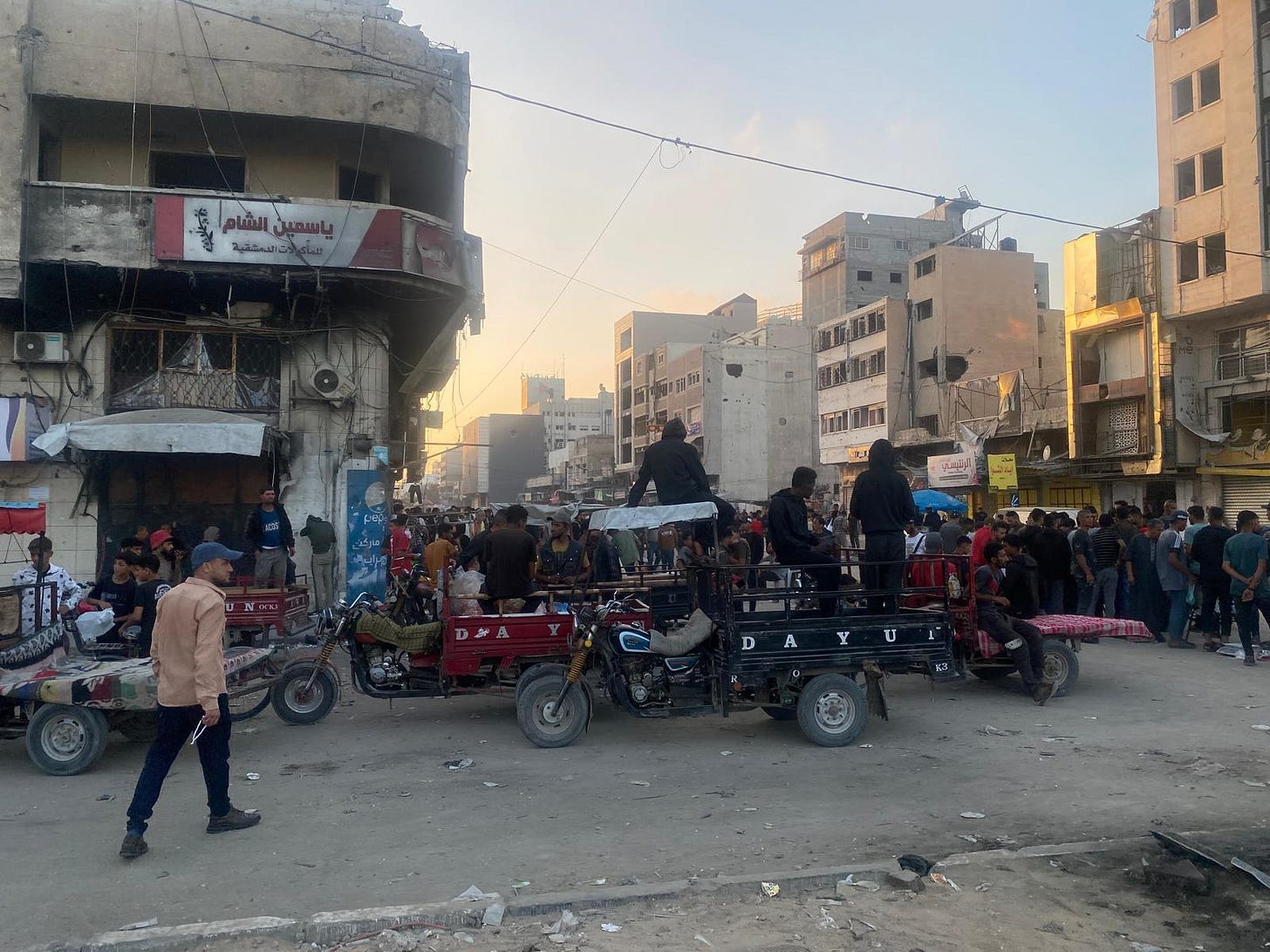“The World Has Abandoned Us” Survivors Recount Horror after Israel Bombs Starving Palestinians in Gaza City
Ahmed Dremly speaks to three survivors of Israel’s airstrike on Gaza City's crowded Al-Saraya Junction on Thursday which targeted aid and security personnel.
At 1:00 p.m. on Thursday, May 23, in central Gaza City’s Al-Saraya Junction, Mohammed Isleem, 35, was walking with his wife and three-year-old son, trying to find a tuk-tuk to take them to visit their relatives in the Al-Nasr neighbourhood in western Gaza. Suddenly, a massive Israeli airstrike hit just 50 meters away.
“The glass from Al-Tabaa Tower shattered and fell on us,” Isleem recalled. “My wife had a panic attack, and my son started screaming. I threw myself over them to shield them, and we rushed into a nearby house, terrified of another airstrike.”
Minutes later, Isleem stepped outside to see what had happened and whether he could help evacuate the wounded to field clinic tents a few meters away. But as he approached the junction, the crowds of people, some covered in blood, were running in the opposite direction.
“A quadcopter drone suddenly appeared, hovering over the dead bodies,” he said. “Everyone thought it was scanning the area for another strike. I ran with people until it left. When it disappeared, we returned to carry the wounded—but it came back again, so we had to flee once more.”
“I saw at least ten bodies,” he continued, “including humanitarian aid security personnel, bystanders, and children.” Reports indicate at least 11 Palestinians were killed in the Israeli attack.
Most eyewitnesses said that moments before the airstrike, chaos had erupted in the area. With hunger gripping the city, many people were looting food and goods from street stalls and shops. Local security tried to stop them, then the missile struck.
Al-Saraya junction is one of Gaza City’s busiest areas. Thousands pass through daily. Many have makeshift stalls selling canned food, tobacco, and recycled diesel. That was the main reason for the high number of dead people.
Sami Al-Barasi, 33, had been standing with his cousins outside his currency exchange shop when the missile struck.
“It hit less than ten meters from me,” he said. “I didn’t even hear the explosion—the pressure alone felt like it would burst my eardrums.”
Al-Barasi couldn’t recognise what was happening around him for seconds. He was snapped back to reality by the sound of screams and the sight of bloodied bodies and dust around him.
“Half a body landed at my feet,” he said. “The charred corpses were scattered everywhere. I didn’t know what to do. I rushed back into my shop to hide, fearing another strike.”
Among those who sought shelter inside were wounded passersby, children, and even a newlywed couple.
“They had been in a car when the missile hit,” Al-Barasi said. “The bride’s white dress was stained with blood from someone outside. When she entered and saw some parts of dead bodies inside, she fainted.”
After about 20 minutes, Al-Barasi stepped outside to check on neighbours who had stalls in the area.
“Four of them were killed,” he said. “A young man who sold canned food, and another man and his five-year-old son who ran a homemade sweets stall.”
This wasn’t the first time Al-Barasi had witnessed such horror. In June 2024, he was breaking wood for cooking on his roof and speaking with neighbours when an airstrike hit and killed his neighbours.
“They became corpses before my eyes,” he said. “I still struggle to breathe when I think about what I’ve seen—and how I survived.”
Most of the dead and wounded were rushed to the Palestine Red Crescent’s Al-Saraya field hospital—some by foot, others in tuk-tuks.
Among the severely injured was 29-year-old Mahmoud Al-Masri, who sold locally made cigarettes with his cousin Fadel Al-Helou, 21, at the junction.
Displaced from Beit Hanoun in the north, Al-Masri had taken over the stall while Al-Helou rested at his family’s makeshift tent near Gaza’s port.
“When I heard the bombing and learned via the news it was Al-Saraya, I ran there,” Al-Helou said. “There was no trace of him or the stall. The missile struck right beside him.”
Al-Helou went to the hospital to search through the dead and injured until he found his cousin—barely alive.
“He’s in a coma,” Al-Helou said. “A piece of shrapnel severed his left leg, and many more are lodged throughout his body. Doctors told us they lack the equipment and supplies to treat him, he could die at any moment.”
Al-Helou called Mahmoud’s wife, 23-year-old Fatima, to reassure her he was still alive. When she arrived at the hospital and saw his condition, she collapsed.
Most of Fatima’s family—including her father and four siblings—were killed in Israeli airstrikes on northern Gaza earlier in 2024.
“My cousin will probably die—not from the bomb, but from the collapse of the health system and hunger,” Al-Helou said. “All of us in Gaza could die at any moment. This war must end—but no one is stopping Israel. The world has abandoned us.”
Ahmed Dremly is a Palestinian journalist based in Gaza City.






yes it appears that the world is on the other side but time will tellthe horror of what they are doing
How do we stop this? How?